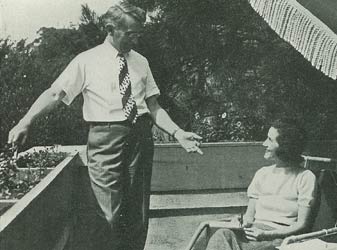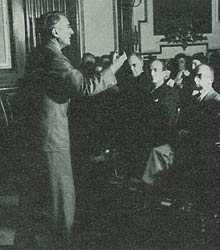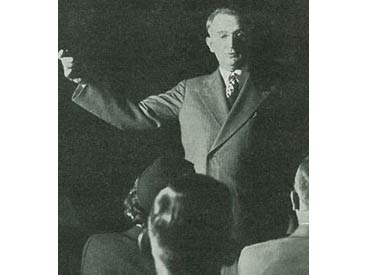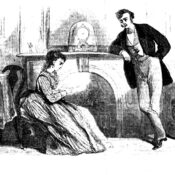Friends and influence—who needs ’em?
It seemed everybody needed them back in the Depression when Dale Carnegie published How To Win Friends and Influence People. The book appeared in bookstores in November, 1936, and was reprinted 16 times in a few months. By the time the Post ran a story on Dale Carnegie the following August, he had made $125,000 on the book—the equivalent of $2 million today.
Carnegie was as surprised by this success as much as anyone. One person who wasn’t surprised, though, was Margaret Case Harriman, author of “He Sells Hope,” the Post article. As she saw it:
The secret of the book’s success seems fairly simple. Every man or woman who buys it is instantly handed, for the sum of $1.96, the information that he, or she, is potentially as powerful, brilliant, rich and successful as anybody in the world, and perhaps a good deal more so than most. Like the beauty doctors and the professors of charm, Dale Carnegie sells people what most of them desperately need. He sells them hope.
But hope didn’t just sell itself, Harriman conceded. She chronicled Carnegie’s long, hard, wandering route to success.
He was born in 1888, in Maryville, Missouri, the second son of a worthy family pursued, to a fantastic degree, by hard luck. His father was a farmer—that is, he would have liked to be a farmer if the One Hundred and Two River had not overflowed every spring and ruined his crops.
Mrs. Carnegie, Dale’s mother, was a devout Methodist who sang hymns at her work, undismayed by the things that happened around her, and who wanted her two sons, Dale and Cliff, to become missionaries.
Young Carnegie proved to be that uniquely American type, the ambitious dreamer. He threw himself into debate and dramatics, seeking any opportunity to get up before an audience and win their attention and admiration. After college and several attempts to become a salesman he developed his own course in public speaking, then wrote a book on the subject. By 1916, Harriman wrote,

Dale Carnegie was doing well. He had conducted courses in public speaking at YMCAs throughout the country with such success that he was able to open his own office, and to hire halls around town where ambitious young men were nightly exhorted to “Speak Out,” to “Go In There and Fight,” to “Wham it Across,” and to “Keep Their Hands Out of Their Pockets.”
The book [on public speaking] lacked the bang-up approach, the sly flattery of the reader, that was later to send the sales of How to Win Friends and Influence People up into the hundreds of thousands.
Eventually, Carnegie came to see that Americans had a greater desire than just an ability to speak in public. They wanted to be liked. They wanted to matter to others. His book, How to Win Friends and Influence People, addressed this need.
Carnegie’s success, according to Harriman, was his discovery of some fundamental truths.
(a) “Deep in every man lies the Desire to be Important,” (b) “A man’s name is to him the sweetest and most important sound in the English language,” (c) “The only way to get the best of an argument is to avoid it,” and (d)—not disclosed in Mr. Carnegie’s works—there is no better way to attract the attention of a care-ridden public than by a wholesale application of comfortable generalities.
She didn’t consider Carnegie to be purposely deceptive, but a well intentioned promoter who stumbled on a concept that was highly marketable, particularly in the challenging Depression years. Carnegie believed that friends and influence were essential to everyday life, which he viewed as—

a grim battle … with people eternally struggling against fearful odds, groping in a vast darkness haunted by specters.
Once he asked a pupil if he was completely happy. The man thought about it briefly, and then said, “Yes.” The answer left Carnegie speechless for half a minute before he unleashed a flood of incredulity upon the happy pupil. Although one of his most frequent counsels to his followers is “Don’t Argue,” Carnegie is a tenacious arguer—always avoiding any appearance of arrogance, however, by adding, “Of course I may be wrong.” The pupil stuck to his statement, and Carnegie, giving in, looked puzzled all evening. He had found one of the few things he couldn’t explain—a contented man. There may have occurred to him the disturbing thought that, if all men were happy, there would be no Dale Carnegie.
It’s hard to say why Harriman took such a cynical view of Carnegie. Thousands of people reported that their lives had been significantly improved by Carnegie’s book and course, and they have remained popular for decades in a country that is continually using up and discarding ideas.
This year, for the book’s 75th anniversary, Dale Carnegie and Associates has produced an updated version, How to Win Friends and Influence People in the Digital Age.
As the New York Times notes, this version may be new but not improved. Carnegie’s plainspoken prose has been updated with terms like “relational longevity” and “faith persuasion,” which sounds like an oxymoron.
Carnegie’s basic message survived the skepticism of Ms. Harriman. It will probably survive this revision for the digital age.
Become a Saturday Evening Post member and enjoy unlimited access. Subscribe now




Comments
What Carnegie conceptualize in the US may not be applicable to other parts of the world.The problem of the US was plenty and to the other underdeveloped countries like India was the lack of it.Hence here we never faced such a problem as the US citizens face.Our problem was lack of resources and opportunities as a result of slavery for more than two centuries under foreign domination.
Dale Carnegie’s “How to Win Friends
And Influence People” came out
With tips on self improvement ends,
When face to face did come about,
Or writing letters for slow mail,
Before the Facebook/Twitter age
Of keyed vocab in abbrev scale,
And banter blogging is the rage.
There’s been an attempted update.
The New York Times review did charge
Molestation was Dale’s book’s fate.
The update – criminal at large.
Carnegie called smiling an ace.
Digitally – use smiley face!
Oh I read Dale Carnegie’s advice on How To Win Friends and Influence People”. I liked it then and think the advice is true today. But a person must be sincere and truthful in talking to the other person. If the words spoken don’t come from an honest heart ,and a soul of integrity, they will ring as hollow as a tin bell.